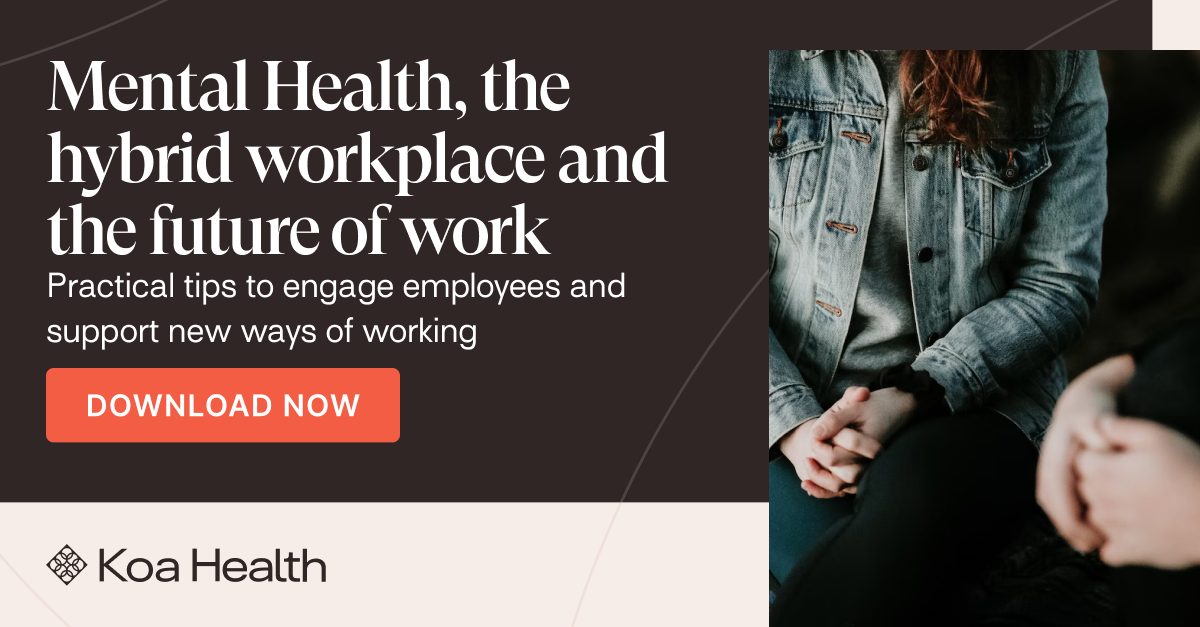Dr Chuk Anyaegbuna, clinical service lead at Koa Health, and clinical psychologist, Dr Tania Johnston discuss how technology can support the current delivery system and improve access to mental health services
Over the last two years, mental health services and the professionals and institutions who deliver them have been pushed to the brink. The shortage of counsellors and psychiatrists in the UK combined with a growing demand for mental health care means that even patients with a formal diagnosis are waiting 18 weeks or longer for treatment (1). And this is without considering the many individuals who fall somewhere in the missing middle – i.e., most of us (2).
What does the current model for mental health services look like?
Mental health exists across a continuum, and every single one of us falls somewhere on the range between mental illness and mental wellness. And wherever we land on the spectrum, we can all benefit from varying degrees of mental health support (3).
Unfortunately, this means that even more people need mental health services and expert guidance at a time when the existing supply chain for mental health services simply cannot keep up with demand – certainly not within the confines of the existing delivery system. The current model varies but is something like the following:
- A patient visits a general practitioner (GP) with a mental health complaint.
- The GP self-refers into mental health services.
- After an uncertain (but increasingly long) amount of time, the patient sees a mental health specialist and gets an assessment and a potential treatment plan.
- After the assessment, the patient can commence treatment with a capped number of sessions (at least to start).
Mental health services require a lot of a very limited resource: Time
Given the current and predicted future ratio of mental health professionals to patients, this isn’t scalable or sustainable. Mental health providers are working hard to reach as many patients as possible, but there are only so many minutes in a day. Teletherapy and video sessions can improve accessibility for patients (and doctors) somewhat, but still require a lot of a very limited resource: Time.
Working with technology to strengthen the mental health supply chain
While technology can never entirely replace face-to-face care for mental health (4), it can greatly expand a busy clinician’s reach. Mental health and wellbeing support delivered via a mobile phone app can also be an accessible source of support for many who may not be open to in-person care because of stigma, convenience or expense. For people struggling with anxious thoughts, sleep issues and common mental health-related issues, this type of self-guided well-being resource can serve as a preventative measure, enabling people to take proactive action before their mental health worsens and requires clinical attention.
The great majority of people in the UK (92%) own a smartphone (5) and are open to this sort of service with a third of UK patients preferring mobile apps to doctor visits (6). In fact, 82% of people who’ve used a digital health solution in the past year, plan to continue using it as much or more as in the past (7). And although some may not immediately ‘trust’ an app, they do trust their doctors – more than any other person or institution, including public health (8). Research shows digital and app-based solutions effectively reduce symptoms of mental health conditions such as depression and anxiety (9), (10). Apps have also been shown to be useful in supporting people’s everyday well-being, helping them maintain their overall well-being and build stronger coping skills (11).
3 Key principles for the use of technology and apps for mental health: ethics, engagement and evidence-base
There are thousands of mental health apps on the market, vying for a piece of a growing market. And while most digital-first mental health solutions claim to be evidence-based, a comparatively tiny percentage are backed by rigorous science. Less than 3% of solutions available on the market have sufficient evidence to back them up (12). To first do no harm, a guiding ethical principle for mental health care (13), (14) it’s essential that any digital solutions offered are thoroughly vetted. Ideally, they’ll have undergone randomised controlled trials (printed in leading peer-reviewed publications) (15) and have positive evaluations from expert reviewing entities like ORCHA (16).
Checking into a provider’s ethics and how they treat and use user data is also crucial to ensuring patients’ private information stays private (17). At a minimum, you’ll want information around languages offered, reading level required, and device compatibility to ensure that a solution increases access to needed support instead of limiting it in a different way.
Engagement matters
Engagement is also crucial – for a solution to benefit employees who need support, they must actually use it (ideally on a regular basis). For specific insights into user engagement, you may need to ask the provider directly, but a product’s average star ratings on the app stores is an excellent place to start your research. Providers should also be able to provide client case studies upon request (18).
When properly vetted, digital-first solutions can help breach existing gaps in traditional care – easing the load of busy providers and fast-tracking access to evidence-based support for many patients.
Does your organisation need help sourcing solutions for mental health and wellbeing? Koa Health can help. Contact us at info@koahealth.com.
About the authors
A medical doctor who is passionate about extending the reach of busy mental health providers with digital-first mental health support, Dr Chukwuebuka Anyaegbuna is Clinical Service Lead at Koa Health.
A firm believer in the power of technology to make mental health care more accessible to more people (and deliver clinically validated techniques), Dr Tania Johnston is a clinical psychologist at Koa Health.
References
- https://www.rcpsych.ac.uk/news-and-features/latest-news/detail/2021/10/06/workforce-shortages-in-mental-health-cause-painfully-long-waits-for-treatment
- https://www.openaccessgovernment.org/scalable-accessible-mental-health-for-all/131668/
- https://koahealth.com/blog-post/comprehensive-care-what-it-is-and-why-it-matters
- https://reba.global/resource/how-a-hybrid-healthcare-approach-combines-digital-tech-with-the-human-touch.html
- https://www.statista.com/statistics/271851/smartphone-owners-in-the-united-kingdom-uk-by-age/
- https://healthcare-digital.com/digital-healthcare/third-uk-patients-prefer-mobile-apps-doctor-visits
- https://www.uk.mercer.com/content/mercer/europe/uk/en/our-thinking/mercer-marsh-benefits-health-on-demand.html
- https://www.uk.mercer.com/content/mercer/europe/uk/en/our-thinking/mercer-marsh-benefits-health-on-demand.html
- https://www.thelancet.com/pdfs/journals/lanpsy/PIIS2215-0366(20)30256-X.pdf
- https://journals.plos.org/digitalhealth/article?id=10.1371/journal.pdig.0000002
- https://mhealth.jmir.org/2022/7/e30976
- https://www.nature.com/articles/s41746-019-0093-1.pdf
- https://www.nature.com/articles/469132a
- https://www.tandfonline.com/doi/full/10.1080/0309877X.2021.1890702?cookieSet=1
- https://koahealth.com/blog-post/landmark-trial-of-nhs-staff-reveals-promising-solution-to-improve-mental-health
- https://koahealth.com/blog-post/digital-mental-health-support-evidence-and-effectiveness
- https://koahealth.com/blog-post/can-a-wellbeing-app-be-ethical
- https://info.koahealth.com/en-gb/foundations-rct?utm_source=EmployeeBenefits&utm_medium=Blogpost&utm_campaign=722
Koa Health
info@koahealth.com

This work is licensed under Creative Commons Attribution-NonCommercial-NoDerivatives 4.0 International.












